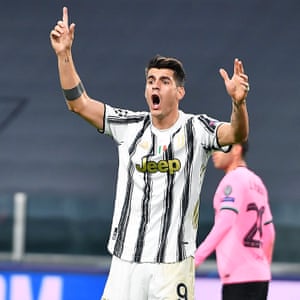There were times in Turin when you could just about glimpse the Barcelona that had once been, and the Barcelona they were trying to become. For a club desperate to shrug off its fetid present, that at least must represent progress. Ousmane Dembélé’s early goal and Lionel Messi’s late penalty were good enough to see off Juventus. A more clinical Barcelona might even have won by more. But this was a good night for Ronald Koeman’s side; and how rarely we have been able to say that of late.
Certainly Koeman will have been impressed with the immediate reaction to Saturday’s 3-1 defeat in the clásico. Off the pitch, Barcelona remain an utter shambles, with the resignation of president Josep Bartomeu this week only adding to the farce currently engulfing the Camp Nou. But it is to Koeman’s partial credit that on the pitch, they are still only an occasional shambles.
And for all the waste and ruin, there remains so much to like about this team. Take Pedri, the fearless 17-year-old attacking midfielder casually handed his first Champions League start, and owning the occasion entirely. Frenkie de Jong in midfield was a delight. Then you have Messi, who even in this sulking, post-imperial phase of his career retains a basic animal magnetism: the hard-wired genius who secretly hates himself for loving football this much. His glorious 60-yard assist for Dembélé’s goal had a kingly disdain to it: a pass completed almost against his will, as if by grudging muscle memory.
Not the Barcelona of old, then, or the Barcelona to come, but some silvery amalgam of the two. Strangely, you occasionally wonder if Andrea Pirlo, the Juventus manager, is beguiled by a similar vision. Pirlo has always held a candle for the club he almost joined in 2010. In his autobiography he writes about the fiercely-contested Barcelona v Barcelona games of Fifa he would play with Alessandro Nesta, a fellow Pep Guardiola fanboy.

And as a fledgling coach he has been heavily influenced by the Cruyff-Van Gaal-Guardiola school of rotations and interchanges, of relentless width and a relentless press and an attacking formation probably best described as a 2-3-5. His Uefa Pro Licence thesis is peppered with references to Guardiola concepts like “the third man” and “juego de posición”. This is, in short, a devotion that goes deeper than the aesthetic.
The problem comes when you have to defend as much as Barcelona made them. The absences of Giorgio Chiellini and Mathias de Ligt felt crucial as Barcelona continually carved them open in transition. Dembélé’s deflected goal may have had a ring of good fortune to it, a hopeful shot that looped over Wojciech Szczesny’s head in a slow- motion comic arc. But as the game progressed, and Juventus were forced to commit numbers back, their threat seemed to disappear entirely.
The absence of Cristiano Ronaldo, confirmed by a third positive Covid test on Tuesday, may have offered thrust up front, where Álvaro Morata had three goals ruled out for offside. But his presence would not have given Pirlo’s side what they need most of all, time and timing. This was the impatience and impetuousness of a team still learning on the job. Merih Demiral’s second yellow card and Messi’s penalty, given after a blundering challenge by Federico Bernardeschi, confirmed Pirlo’s first defeat as Juventus manager.
Did this game change anything? Pirlo will already have known the scale of his task; Messi may have wanted Bartomeu gone, but he also wants a squad capable of winning the Champions League. Koeman knows his days may yet be numbered if Victor Font wins the presidential election and replaces him with Xavi. In the long run, these wider problems remain unresolved. But perhaps this was a night to remind us that the idea of Barcelona – whether a golden past, a tantalising future or a flawed present – remains as seductively potent as ever.
from Football | The Guardian https://ift.tt/3mwDnlA
via IFTTT

No Comment